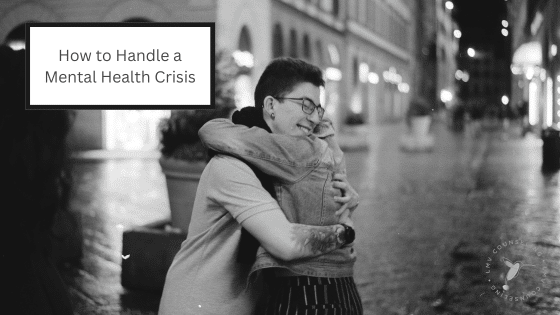What Is a Mental Health Crisis?
A mental health crisis happens when someone feels completely overwhelmed or unable to cope with their emotions or thoughts. It can range from intense panic attacks to suicidal thoughts, self-harm, or even hallucinations and delusions. If you’ve ever thought, Am I having a mental health crisis right now?—you might be.
Symptoms of a Mental Health Crisis
A crisis can feel deeply isolating and hopeless. Symptoms might include:
- Overwhelming despair
- Withdrawing and isolating
- No longer able to complete daily tasks
- Feeling helpless or hopeless
- Intense loneliness
- Fear of “going crazy”
- Thoughts of escape or wanting relief from pain
If these feelings resonate, it’s important to know you’re not alone, and help is available.
When Is It Time to Seek Help?
The simple answer: anytime you feel you might need help. Don’t wait until it feels unbearable. If daily tasks become overwhelming or you’re questioning whether you need support, reach out to a mental health professional.
If you think “it can’t be that bad” well allow yourself a visit to a mental health professional for an evaluation. After all, you wouldn’t let the symptoms of a heart attack stop you from seeing you doctor to make sure your heart is okay. Have a conversation with a mental health professional to see what services and help you might benefit from
 Who Can You Turn To for Help?
Who Can You Turn To for Help?
- Call 988: This hotline is for anyone in crisis—not just those experiencing suicidal thoughts.
- Text 741741: Perfect for situations where talking isn’t possible, like at work or in public. You can text, chat online or on whatsapp.
- Mobile Crisis Teams: These professionals assess the situation and provide on-the-spot support. For New Hanover County, you can call 866-437-1821. The team will advise you on the phone of what to do and even come out and meet you in the community. They’ll assess your situation, symptoms and provide you recommendations.
- Emergency Departments: If the situation feels life-threatening, go to the nearest hospital.
- NAMI Helplines: The National Institute of Mental Health has wonderful resources to connect you and friends and family to support.
How Friends and Family Can Help
If someone you know seems to be in a crisis, here’s how you can support them:
1. Speak Up
If you’re worried, say something. A simple, “I’ve noticed you seem off lately,” can make a difference. Let’s operate under the TSA adage. If you see something, say something.
2. Assess Your Role
If you’re not close to the person, involve someone they trust. For example, tell a mutual friend who might be better equipped to step in. If you aren’t that close to a person but are still concerned about their health, reach out to someone you know is close to the person you’re concerned about. They can speak to the person and convey observations and concerns. It’s not gossip. It could possibly save someone’s life.
3. Actively Listen
Validate their feelings without judgment. Avoid saying things like, “It’s not that bad” or “Just cheer up.” It takes a lot of courage for someone to share their innermost thoughts and feelings. Be there to provide whatever help they need. Keep your voice calm and even. Move slowly and make eye contact. Convey understanding through nodding your head and open body language. Reflect back what you have heard from the person sharing to make sure you are understanding what they are sharing.
4. Intervention for Suicidal Ideation: Use QPR (Question, Persuade, Refer)
- Question: Ask directly, “Are you thinking about harming yourself?”
- Persuade: Encourage them to seek help.
- Refer: Connect them to resources, like hotlines or therapists.
5. Follow Up
Check in after the immediate crisis is over. The days and weeks following a crisis are critical for recovery. Your friend or family member might need a lot of rest. Or maybe they need some extra TLC while they are getting their life back on track.
FAQ About Mental Health Crises
What qualifies as a mental health crisis?
A mental health crisis includes any situation where someone feels overwhelmed and unable to cope, such as panic attacks, suicidal thoughts, or severe emotional distress.
Should I call 911 for a mental health crisis?
Yes, if someone’s life is in immediate danger. Otherwise, consider calling 988 for specialized mental health support.
How can I help a friend in crisis?
Listen without judgment, encourage them to seek help, and connect them with resources.
FAQ About LMV Counseling
What services does LMV Counseling offer?
LMV Counseling provides therapy for individuals and can help support in addressing mental health concerns. We provide therapy in person and online to accommodate your lifestyle.
Can LMV Counseling help during a crisis?
While we aren’t a crisis center, our therapists can guide you toward long-term healing after the immediate crisis has passed.
How do I get started with LMV Counseling?
Complete an appointment request form. Let’s get started on your healing journey today. If you’re a friend or family member, you too can complete an appointment request form! We will reach out to the individual to get them started. Do us a favor- give the person a head’s up that you have completed an appointment request form for therapy. It is much smoother that way and increase the chances that they will book an appointment to get help.
Remember, a mental health crisis is scary, but you’re not alone. Whether you’re seeking help for yourself or supporting someone else, there are resources and people ready to help. Reach out- you don’t have to experience this alone.

